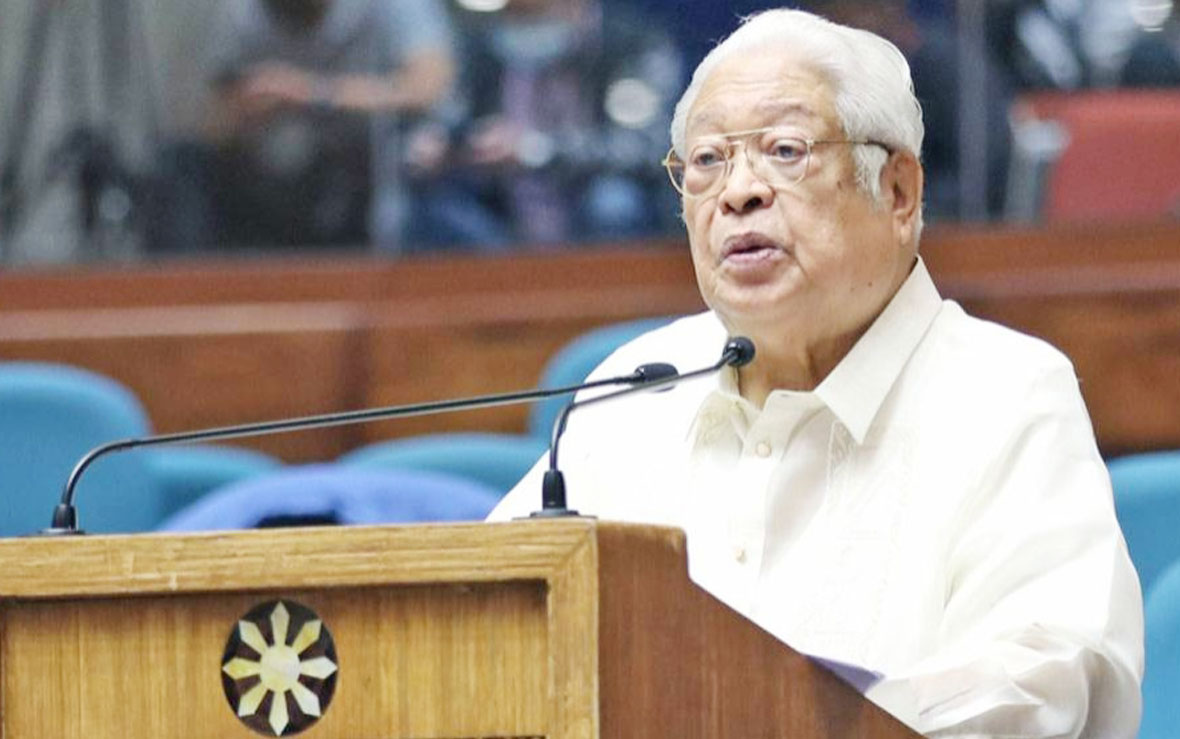KINUWESTYON ni Albay Ist District Representative Edcel Lagman at Liberal Party President ang balak na hakbang na bigyan ng P100 ang lagda ng bawat botante upang maisabatas lamang ang isinusulong ng Kamara na pagbabago ng Saligang Batas o Charter Change (Cha-cha) sa pamamagitan ng kampanya nito na People’s Initiative (PI).
“If the campaign for people’s initiative to amend the Constitution is inspired by noble and patriotic motives, then why buy the people’s will?,” ang pahayag ni Lagman sa kanyang official website.
“Former Ako Bicol Party-List Congressman Pido Garbin is expected to deny that the various municipal mayors present during the meeting in the afternoon of 05 January 2024 at Ellis Hotel in Legazpi City received from Ako Bicol coordinators 50% of the total amount of P100 per voter constituting 3% of the total voters per municipality compromising their legislative districts,” dagdag pa ni Lagman.
Ang pag-amyenda sa Constitution ay maaaring isagawa kung labindalawang porsiyento (12%) ng populasyon ng mga rehistradong botante katumbas ng tatlong porsiyento (3%) mula sa bawat legislative district ng bansa ay may direktang panukala sa pamamagitan ng petition na baguhin ito.
Iginiit ni Lagman na ang pagbili ng lagda para sa isang petition ng People’s Initiative ay isang paglabag sa batas.”The buying of signatures for the petition on people’s initiative is a violation of the Sec. 261 of the Omnibus Election Code in relation to Sec. 19 of the Initiative and Referendum Act (RA No. 6735),” ayon kay Lagman.
“Disturbing questions have to be answered like who is the mastermind of this campaign? What are the proposed amendments to be pursued? Where do the funds come from? Why buy the voters’ initiative?”ang mga tanong ni Lagman.
“The initial purpose of this Charter change by people’s initiative is to make the voting in the constituent assembly (Con-Ass) of representatives and senators or in calling for a Constitutional Convention (Con-Con) as joint voting in order to overwhelm by superiority of numbers the Senators by the Representatives,” paliwanag ni Lagman.
Matatandaang nagpahayag ang liderato ng mababang kapulungan ng Disyembre ng nakaraang taon na ilulunsad ang mas agresibong kampanya sa Cha-Cha sa pamamagitan ng PI matapos mabigong makuha ng mga kongresista ang suporta ng Senado na nagbasura sa mga unang panukala ng Kamara ukol dito.
Sa mga naging pahayag ng ilang senador, nagpaliwanag ang mga ito na ang pangunahing dahilan ng kanilang pagbasura sa Cha-cha ay maaari anyang magamit ito sa pagpapalawig sa termino o “term extension” ng mga nakaupo sa puwesto. Ang People’s Initiative o PI ang isa sa paraan o mode ng pag amyenda sa Constitution o saligang batas na maaaring hiwalay sa senado.
“We will highly recommend that we embark on the people’s initiative to cure this impasse, so to speak, on how we vote,” ang mga unang pahayag ni House Speaker Ferdinand Martin Romualdez.
Ipinaliwanag ni Romualdez na nais ng Kongreso na mapaunlad ang ekonomiya ng bansa sa pamamagitan ng pag-amyenda ng Konstitusyon at pagtanggal ng restrictive provisions dito upang mas maengganyo ang pagpasok ng mga dayuhang mamumuhunan na magpapasigla rito.
“We want to do this because we really want to address the economy. We want to lift the restrictive provisions in our Constitution, vis-a-vis the economy. We feel that the Constitution should be prospective and not reactionary.Right now. It is very prohibitive, the most prohibitive in the region.We would like to lift these restrictions…just like other nations do. So, this is what we will be embarking on in the ensuing months. And we will be working hand in hand with economic managers to see what are the priorities and what we should take up first.These are all being undertaken in pursuit of the economic managers’ thrust to transform the economy under the administration of President Marcos. It’s been three and a half decades. We feel that it’s timely and that we would like to get your support as well in this matter,” ang paliwanag ni Romualdez sa unang pahayag kung bakit isinusulong ng kamara ang Cha-cha.
Ipinaliwanag ni Lagman ang isang ruling ng Supreme Court in Santiago v. Comelec (G.R. No. 127325) na bagamat pinapayagan ng batas na maamyendahan ang Constitution sa pamamagitan ng direktang panukala ng People’s Initiative, subalit maaari rin itong tanggihan kung may mga depekto ito. “While the Constitution allows amendments to be directly proposed by the people through initiative, there is no compliant implementing law for the purpose and in Lambino v. Comelec (G.R. No. 174153) the Supreme Court denied the petition for people’s initiative for various fatal defects,”dagdag ni Lagman.
“Sec. 19 of the Imitative and Referendum Act provides:SEC. 19. Applicability of the Omnibus Election Code.—The Omnibus Election Code and other election laws, not inconsistent with the provisions of this Act, shall apply to all initiatives and referenda.Sec. 261 of the Omnibus Election Code provides:Section 261. Prohibited Acts.
The following shall be guilty of an election offense:(a) Vote-buying and vote-selling. –(1) Any person who gives, offers or promises money or anything of value, gives or promises any office or employment, franchise or grant, public or private, or makes or offers to make an expenditure, directly or indirectly, or cause an expenditure to be made to any person, association, corporation, entity, or community in order to induce anyone or the public in general to vote for or against any candidate or withhold his vote in the election, or to vote for or against any aspirant for the nomination or choice of a candidate in a convention or similar selection process of a political party.
(2) Any person, association, corporation, group or community who solicits or receives, directly or indirectly, any expenditure or promise of any office or employment, public or private, for any of the foregoing considerations.The Supreme Court rulings in Santiago v. Comelec and Lambino v. Comelec were cited as historical backdrop where people’s initiative had failed,” pagbanggit ni Lagman sa mga probisyon ng batas na maaaring basehan sa isyu na ito. Ma. Luisa Macabuhay-Garcia








